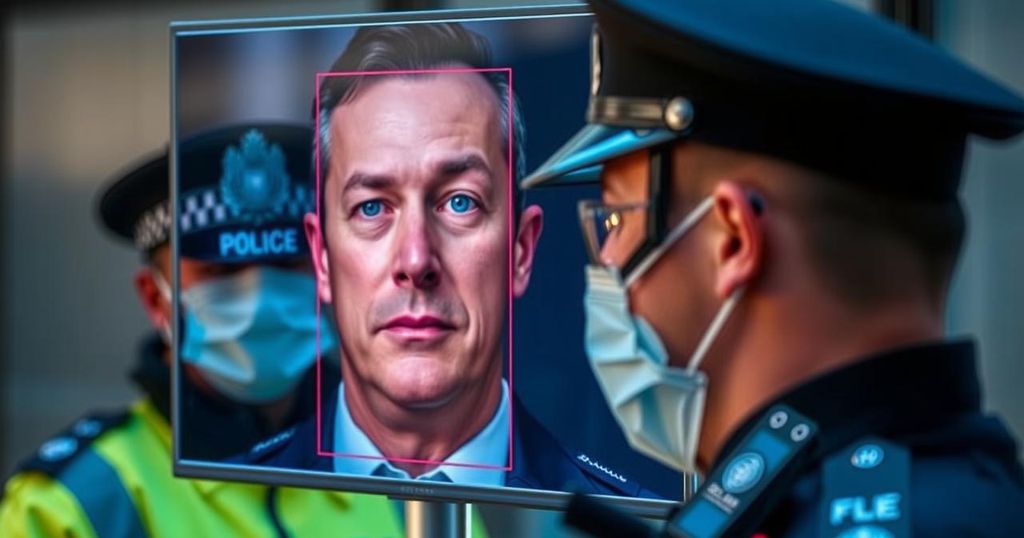South Wales and Gwent police are implementing the operator-initiated facial recognition (OIFR) app to enhance suspect identification using mobile technology. Despite its promise for efficient operations in emergencies, the app has attracted criticism for potential privacy breaches and disproportionate targeting of ethnic minorities. The ongoing conversation about regulatory oversight highlights concerns over protecting civil liberties against expanded surveillance powers.
Police forces in South Wales and Gwent are initiating the deployment of a mobile app designed for facial recognition, enabling officers to take photos of individuals and compare them to a database in near real-time. Known as operator-initiated facial recognition (OIFR), this technology aims to expedite the identification process for suspects and missing persons. The application can also facilitate identification in situations where individuals are incapacitated or provide false identities, thereby streamlining police operations in critical scenarios.
Trudi Meyrick, assistant chief constable of South Wales Police, emphasized the app’s utility by stating, “This mobile phone app means that with the taking of a single photograph which is compared to the police database, officers can easily and quickly answer the question of ‘Are you really the person we are looking for?'” Despite its advantages, the technology has faced backlash from digital rights advocates who argue it raises significant privacy concerns. Rights groups like Big Brother Watch caution that police use of facial recognition may result in searches of numerous innocent individuals’ images, leading to potential misuse.
The app has undergone testing with 70 officers, reportedly leading to expedient arrests. Nevertheless, critics assert that the scheme disproportionately impacts ethnic minorities and involves unethical use of unlawfully retained images. This concern is compounded by the fact that previous high court rulings deemed the retention of images of individuals not charged with any crime unlawful, highlighting ongoing privacy issues. The police contend that the application will not store images from the scans and will only be utilized in contexts involving significant risks to the public.
Concerns about compliance with existing regulations underpin discussions about the broader context of biometric technology usage in the UK. After allegations of inadequate oversight in England and Wales, there are growing calls for a reinstatement of an independent commissioner overseeing biometric practices. The removal of the Biometrics and Surveillance Camera Commissioner’s position has further underscored the need for cohesive regulation, as emphasized by Brian Plastow, the Scottish Biometrics Commissioner, who pointed out the absence of independent oversight under current policies. With new technological implementations ongoing within the UK police force, the dialogue about their implications for personal privacy and civil rights remains at the forefront.
The South Wales and Gwent police units are pioneering the usage of mobile facial recognition technology in the UK. Operator-initiated facial recognition (OIFR) is a significant advancement in law enforcement capabilities, allowing police to swiftly identify individuals against a database using just a mobile phone. However, the technology’s rapid adoption has sparked substantial debate about privacy violations and potential misuse, especially concerning images of innocent citizens being scrutinized without consent or legal backing. Moreover, the regulatory landscape in the UK surrounding biometric technology has come under scrutiny due to the lack of oversight mechanisms, further complicating the ethical implications of employing such advanced tools in policing.
In summary, the introduction of the OIFR app by South Wales and Gwent police marks a noteworthy advancement in law enforcement capabilities with the potential for rapid suspect identification. However, significant concerns have been raised regarding privacy violations and the ethical implications of scanning innocent individuals’ images. The call for better regulatory oversight and the need to protect civil liberties continue to dominate discussions around the use of biometric technology in policing. Unless these issues are adequately addressed, trust in law enforcement could suffer, particularly among marginalized communities.
Original Source: www.biometricupdate.com





